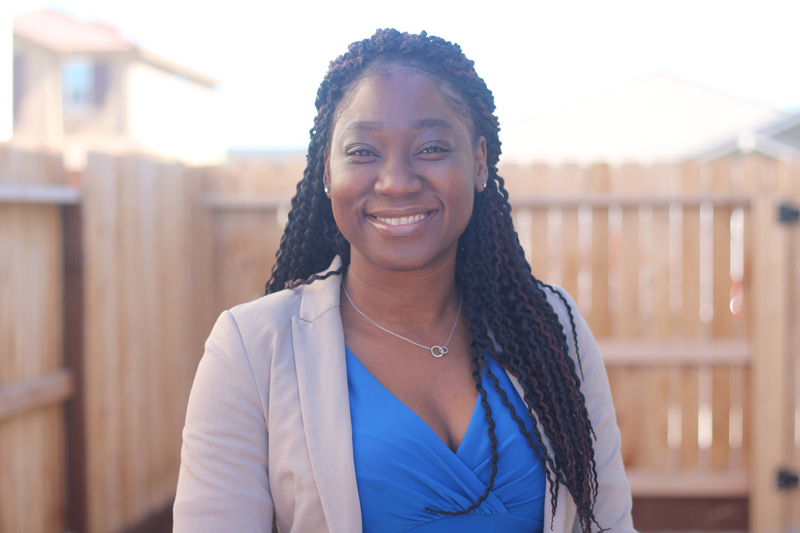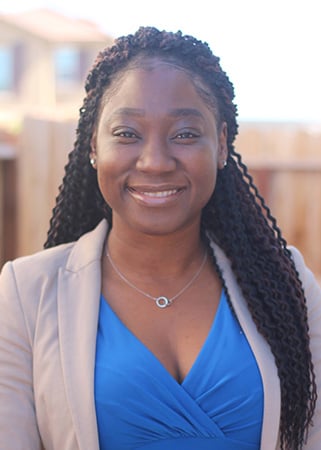Nurse Leader and Founder of Community Health Outreach Nonprofit in Nigeria Receives Jeannine Rivet Award

Nurse Leader and Founder of Community Health Outreach Nonprofit in Nigeria Receives Jeannine Rivet Award
Ayomidamope (Ayo) Adebiyi, MSN, APRN, FNP-BC, COHC, CEN, has been selected as the recipient of a fellowship made possible by the Jeannine Rivet National Leadership Fund. The annual $10,000 fellowship has been established by the American Nurses Foundation (the Foundation) through a gift from the United Health Foundation (UHF) to support emerging nurse leaders to integrate their health expertise into new civic and professional opportunities.
Ayo is an occupational health nurse practitioner through Work Health Solutions at the University of California, Merced. Throughout her career, she has demonstrated outstanding leadership skills and an aptitude for innovation as an influential community health advocate. She has advocated for migrant farmworkers in Florida, mentored UCLA students conducting community service in economically and socially disadvantaged communities in Los Angeles and has worked with the Clinton Global Initiative University. In 2018, Ayo founded “Care for the Unreached”, a non-profit community health outreach service for mothers and infants in rural communities of Nigeria. Through partnerships with community primary health centers, “Care for the Unreached” supplies expectant and new mothers free quarterly prenatal and antenatal health clinics, newborn care kits, birth control methods, health teachings on the importance of breastfeeding, and immunization vaccinations. Colleagues have described Ayo as “unstoppable”.
The Foundation recently caught up with Ayo to get her insights and commentary on how she is using her impactful leadership skills and expertise to enhance health care delivery within the nursing profession and make a difference in the lives of many globally:

Q1. What was your motivation to become a family nurse practitioner?
A. “I believe my personal life influenced my decision to become a nurse. I was born prematurely at 29 weeks as one of a set of triplets – two boys and myself. My mom delivered three babies who were all alive, but she ended up losing the two boys due to lack of appropriate health care and only I survived. Hence, I became passionate about family medicine, health care equity and access, especially for African women and children. I’m particularly focused on maternal, newborn and child mortality because I’m a woman and because statistics don’t lie. Maternal mortality in Black women is three times higher than white women. My career in health care was the only way that I could address the same issues that led to the deaths of my two brothers, so I always felt like I really didn’t choose nursing but that my life was orchestrated towards this profession.”
Q2. What was the catalyst for creating the nonprofit "Care for the Unreached," which aims to address the health needs of rural communities in Nigeria?
A. “As a proud Nigerian who immigrated to the United States, I am very passionate about Nigeria and have always wanted to give back and contribute to my native country. I grew up seeing the gap in health care delivery that needed to be filled, developing a goal to serve and wanting to do work that would touch people’s lives. In Nigeria, the chance of a woman dying from childbirth, pregnancy or necessitated abortion is one in 22; whereas, in the developed country where I live, the chance is 1 in 4900. That is a huge contrast and there are many factors that lead to these negative outcomes. One, is the overall quality of health care institutions and the lack of access to basic primary health care in many rural communities in Nigeria. Also, according to WHO, one-in-five Nigerian children never make it to age five. Some of these are preventable deaths, such as malnutrition, lack of access to life saving vaccinations, and pre-term delivery without specialized and supportive care. One of the goals of the UN is to reduce neo-natal and under age five mortality rates by one third, and for Nigeria to achieve this goal, we cannot leave it alone for the government to tackle. That is what ‘Care for the Unreached’ is trying to do. We set our mission to discover how our local interventions and initiative can lead into national and global gains in addressing these issues.”
Q3. Can you please share some of the positive health outcomes you are seeing that have developed from "Care for the Unreached"?
A. “This project in Nigeria is primarily being run by a host of partners and volunteers on the ground and the various primary health centers who open their doors for our nonprofit to come in. Through these partnerships, we have been able to open more than nine community health care outreach centers and provided prenatal and antenatal health teachings to more than 1,000 new mothers who also received free newborn care packages. The attendance to our community health outreaches also increased access to childhood vaccinations. So far more than 500 babies have been able to receive vaccinations that will protect them against preventable diseases.”
Q4. Given the fellowship opportunity you received for additional leadership experience via this award, where do you hope to be professionally in 10 years?
A. “I would like ‘Care for the Unreached’ to expand and continue its outreach in Nigeria, changing people’s lives in unimaginable ways and thereby strengthening and equipping health systems, using primary health care as the entry point. We will continue to call on people to join this train and help create a platform of good health for women because a healthy woman translates to a healthy society.”
Q5. You have experience in being a mentor to UCLA students as well as some of your colleagues. What advice would you give to emerging nurse leaders?
A. “First, if the COVID-19 pandemic has taught us anything it’s that we have to see ourselves as global citizens and recognize that we live in a global village. I am always aware of that. I believe the pandemic has shown how blurred geographical borders have become and the need for us as health care advocates to be involved and aware of things happening in other parts of the world as well. As nurses and health care leaders, it is incumbent upon us to pay it forward in a positive way.
Second, as a nurse leader who is actively involved in mentorship and various projects, managing all my engagements can be and is sometimes challenging and overwhelming, but I think when you’re passionate about something you always have the opportunity and the room to get it done. Find your niche and pursue your passion. It doesn’t mean it’s not going to be challenging but you just need to find a way, even if it means waking up at night to meet the deadlines.”
This is the fourth Jeannine Rivet National Leadership Award, sponsored through the generosity of UHF, established to be awarded annually over the course of 10 years. It honors Jeannine Rivet, MPH, RN, FAAN, retired executive vice president of UnitedHealth Group, for her impactful contributions to health care and business through leadership and various community roles. This fellowship fund underscores the commitment of UHF to increase the impact of nurse leadership and inspire the next generation of nurse leaders through its partnership with the Foundation.
“The United Health Foundation is honored to support the important work of the nursing profession. Each year, it’s exciting to witness trailblazing nurses embody Jeanine’s legacy and carry the torch as the next generation of nurse leaders making a difference,” said Tracy Malone, president of the United Health Foundation.”
The Foundation is sincerely grateful and proud to work with UHF in this effort to honor Jeannine Rivet’s legacy and to amplify the successes, contributions, and collective voices of nurse leaders everywhere.
###